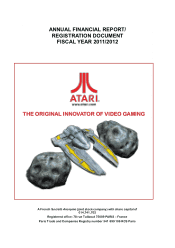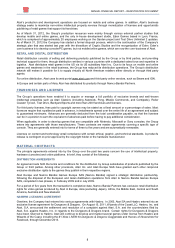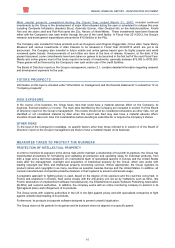Atari 2012 Annual Report Download - page 8
Download and view the complete annual report
Please find page 8 of the 2012 Atari annual report below. You can navigate through the pages in the report by either clicking on the pages listed below, or by using the keyword search tool below to find specific information within the annual report.
ANNUAL FINANCIAL REPORT – REGISTRATION DOCUMENT
8
Atari’s production and development operations are focused on mobile and online games. In addition, Atari’s business
strategy seeks to maximize non-online intellectual property revenue through monetization of licenses and opportunistic
publishing of retail games that support its franchises.
As of March 31, 2012, the Group's production resources were mainly through various external partner studios that
develop mobile and online games, and the only in-house development studio, Eden Games based in Lyon, France,
which is comprised of approximately 20 employees working on the Garden project and Test Drive Unlimited 2 updates.
As of March 31, 2012 the Company has started a formal disposal process, which is the continuation of the Company’s
strategic plan that was started last year with the divestiture of Cryptic Studios and the reorganization of Eden. Eden’s
core business is to develop console/PC games, but not mobile/online games, which are now the core-business of Atari.
RETAIL AND DIGITAL DISTRIBUTION
Retail distribution consists of selling and delivering products published by the Group or by third parties, and providing
technical support for them, through distribution entities in various countries with a dedicated sales force and expertise in
logistics. Atari distributes retail games in the US via its US subsidiary Atari Inc. Due to its focus on mobile and online
games and weakness in the retail business, the Group has reduced its distribution operations. The Group’s distribution
network still makes it possible for it to supply virtually all North American retailers either directly or through third party
agents.
For online distribution, Atari uses its web portal www.atari.com and third party online vendors, such as Steam and IGN.
In Europe and certain parts of Asia, Atari has distributed its products through Namco Bandai Partners.
FRANCHISES AND LICENSES
The Group's operations have enabled it to acquire or manage a full portfolio of exclusive brands and well-known
intellectual properties such as Atari Classics (including Asteroids, Pong, Missile Commends, and Centipede), Roller
Coaster Tycoon, Test Drive, Backyard Sports and more than 200 franchises and licenses.
For third party licenses, fees paid to copyright owners may be stated as a fixed amount or a percentage of sales. Most
licensors require that royalties be paid in advance, in installments spread over the entire life of an agreement and subject
to guaranteed minimums. Advances are generally deducted from the total consideration payable, so that the licensee
can be in a position to earn the equivalent of advances paid before having to pay additional consideration.
When applicable, in order to develop games that are compatible with Nintendo, Microsoft or Sony consoles, the Group
enters into agreements with those manufacturers. These contracts are master agreements covering a specific type of
console. They are generally entered into for terms of three to five years and are automatically renewable.
Licenses on content and technology entail compliance with certain ethical, graphic, and technical standards. A product's
release is contingent on prior approval by the copyright holder or the hardware manufacturer.
MATERIAL CONTRACTS
The principle agreements entered into by the Group over the past two years concern the use of intellectual property,
hardware (consoles) and online platforms. In brief, they consist of the following:
DISTRIBUTION AGREEMENTS
An agreement sets forth the terms and conditions for the distribution by Group subsidiaries of products published by the
Group or third parties. Among other provisions, Atari Inc. and Atari Europe SAS have granted each other reciprocal
exclusive distribution rights to the games they publish in their respective regions.
Atari Europe and Namco Bandai Games Europe SAS (Namco Bandai) signed a strategic distribution partnership,
following the disposal of the European and Asian distribution operations from Atari to Namco Bandai Games Europe
SAS, completed in two phases, in February 2009 and in July 2009.
For a period of five years from the transaction’s completion date, Namco Bandai Partners has exclusive retail distribution
rights for video games produced by Atari in Europe, Asia (excluding Japan), Africa, the Middle East, Central and South
America, Australia and New Zealand.
HASBRO LICENSING AGREEMENT
Overtime, the Company had entered into various agreements with Hasbro. In 2005, Atari SA and Hasbro entered into an
exclusive license agreement for Dungeons & Dragons. On August 15, 2011, Wizards of the Coast LLC, Hasbro, Inc. and
Atari, S.A. announced the settlement and resolution of a complaint against Atari, S.A. and the counterclaims filed by
Atari, S.A. against Hasbro, Inc. in regards to the Dungeons & Dragons brand. Certain rights for Dungeons & Dragons
have been returned to Hasbro. Atari will continue to develop and market several games under license from Hasbro and
Wizards of the Coast, including the #1 Xbox LIVE® hit Dungeons & Dragons: Daggerdale and Heroes of Neverwinter for
Facebook, through December 2013.





















